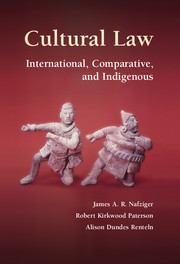Book contents
- Frontmatter
- Contents
- Preface
- Acknowledgments
- 1 Cultural Law: An Introduction
- 2 Culture and Law: The Basics
- 3 Cultural Heritage Law: Introduction
- 4 Cultural Material: Protection and Cooperation
- 5 Cultural Material: Rectification, Criminal Justice, and Dispute Resolution
- 6 Intangible Cultural Heritage
- 7 Museums
- 8 Sports
- 9 Religion
- 10 Language and Linguistic Expression
- Index
Preface
Published online by Cambridge University Press: 05 June 2012
- Frontmatter
- Contents
- Preface
- Acknowledgments
- 1 Cultural Law: An Introduction
- 2 Culture and Law: The Basics
- 3 Cultural Heritage Law: Introduction
- 4 Cultural Material: Protection and Cooperation
- 5 Cultural Material: Rectification, Criminal Justice, and Dispute Resolution
- 6 Intangible Cultural Heritage
- 7 Museums
- 8 Sports
- 9 Religion
- 10 Language and Linguistic Expression
- Index
Summary
The inspiration for this book has several sources. The core themes of linguistic and other cultural rights, cultural identity and differentiation, cultural heritage, traditional knowledge, sports, and religion are of fundamental importance to humankind. They are matters that truly engage people at the grass roots, often commanding their daily attention. The related legal processes are both significant and complex. It is therefore not surprising that a vast legal literature has blossomed concerning themes of cultural activity and artifacts. And yet this intellectual development remains on the fringe of legal and social science education. Courses on issues of cultural law or culture and law are few and far between. To the best of our knowledge, this is the first comprehensive coursebook covering a broad range of these issues.
A first source of inspiration for this book, then, is the need we have perceived to bring cultural law more into the mainstream of legal and social science education. A second, related source of inspiration is the opportunity to offer a more integrated, coherent framework for studying the diverse themes of cultural law. Clearly, there are common threads running through these themes and the related legal processes. Certain rules of tort, contract, constitutional, and administrative law, as well as methods and procedures of dispute resolution, recur throughout the book, regardless of the specific cultural theme. Likewise, we consider the role of international law – both customary and conventional – throughout the book. Although the specific topics of “art law,” “sports law,” “law and religion,” “cultural rights,” “traditional knowledge,” and so on, serve important organizational and analytical purposes, they also minimize the reality of a common framework of cultural law. These discrete rubrics are also misleading insofar as students and practitioners alike may fail to appreciate the possibilities of broader professional specialization in cultural law.
- Type
- Chapter
- Information
- Cultural LawInternational, Comparative, and Indigenous, pp. xxiii - xxviPublisher: Cambridge University PressPrint publication year: 2010



